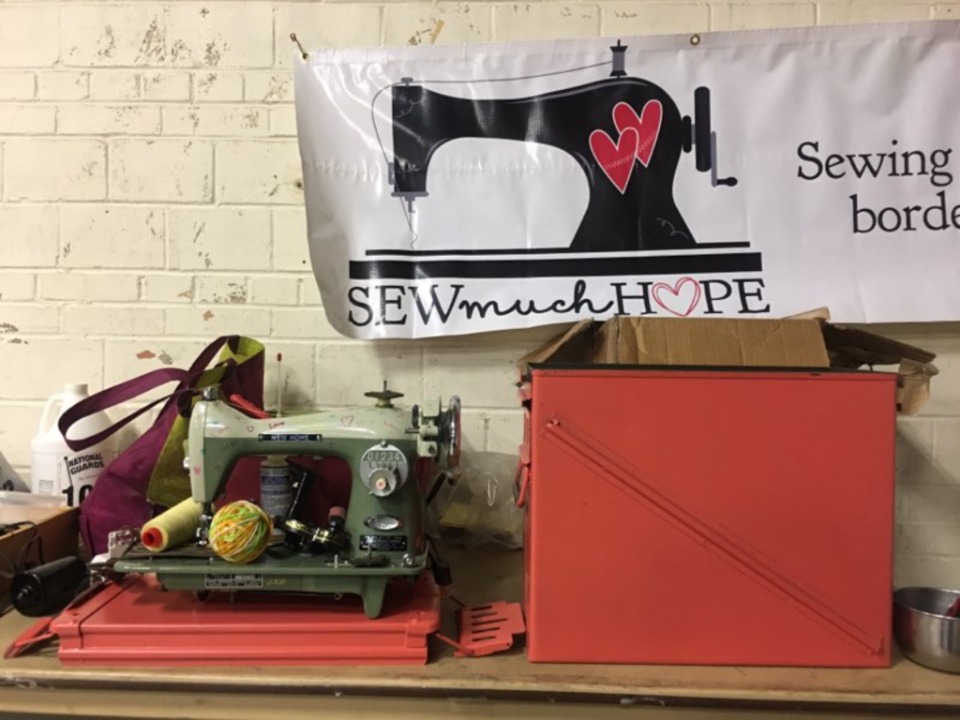
This story appears here courtesy of TheChurchNews.com. It is not for use by other media.
By Mary Richards, Church News
Women in Guyana were hand-sewing face masks during the COVID-19 pandemic when Latter-day Saint Charities and Sew Much Hope partnered together to send 90 sewing machines to the South American country.
Now many of those same women are using the machines to make a living for themselves and better their lives.
These aren’t just ordinary sewing machines. They were converted to hand-crank models that don’t need electricity. They only take a little bit of training and occasional simple upkeep — perfect for a particular situation in Guyana.
Sewing Face Masks by Hand
Sewing cloth face masks — even by hand — in 2020 provided women in Guyana a chance to make money during the pandemic, especially for refugees from nearby Venezuela, like Olive da Silva. The program was supported by the UNHCR, the United Nations Refugee Agency, and The Church of Jesus Christ of Latter-day Saints.
“It’s very helpful for me because I have no foundation here, my life was in Venezuela,” said da Silva in a U.N. Guyana blog post. “This is helping me financially, to be active, doing something to be able to have a community here again.”
But when Cameron Hatch with Latter-day Saint Charities saw the pictures of the project, he noticed they were sewing the masks by hand.
“I asked, ‘Do any of these women have sewing machines?’ They said no. I said, ‘Is there a reason why?’ They said, ‘Yeah, they don’t have electricity.’ And the light bulb went on for me,” Hatch told the Church News this week.
Hatch spoke to Sew Much Hope founder Gino Rich about getting sewing machines to Guyana. Sew Much Hope takes old or donated sewing machines and converts them into hand-crank models for third-world countries. Rich was completely on board with Hatch’s idea.
Sending the Sewing Machines to Guyana
Rich had never done anything on this large of a scale before. But within a few months, Hatch and Rich and other volunteers converted 80 hand crank machines to ship to Guyana, plus 10 electric machines for the U.N. Livelihood Centers around that country.
In December 2020, they packed the 90 machines onto three pallets with their cases and bobbins and tools. They padded the spaces around them with donated dresses and other clothing from the Church’s Humanitarian Center in Salt Lake City for the women in Guyana to use or tailor as needed.
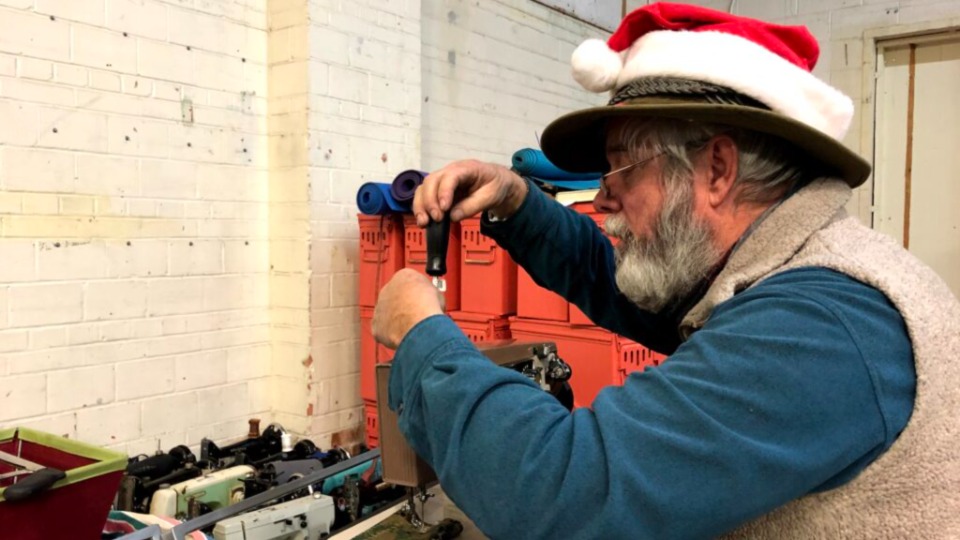
Rich then helped virtually train a group of women on how to use the sewing machines. Those women in turn became master trainers to show others how to use them. By the end of the mask-making project, the women had sewn more than 50,000 face masks that were purchased by UNHCR and distributed to people throughout Guyana during the pandemic.
“There is nothing more empowering than a sewing machine in the hands of a woman,” Rich said.
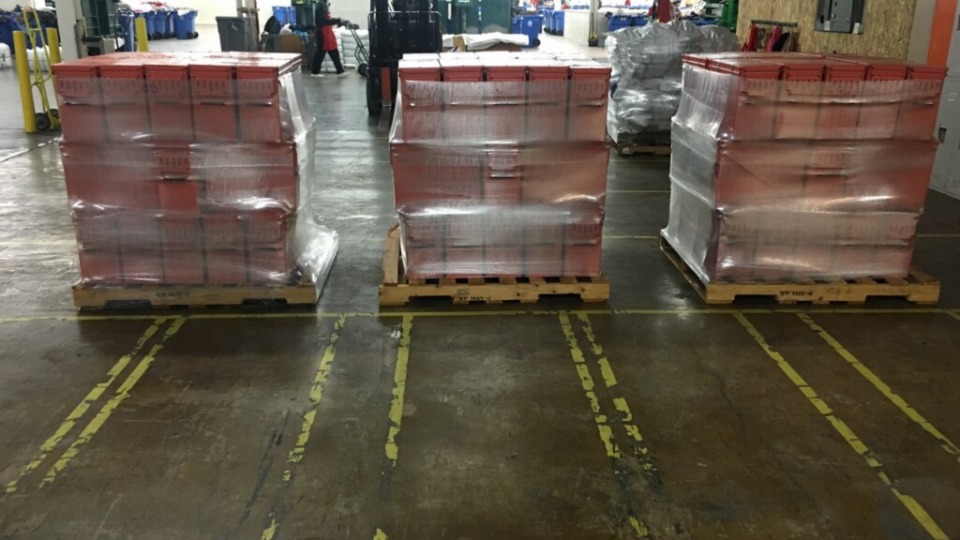
Starting a Sewing Business
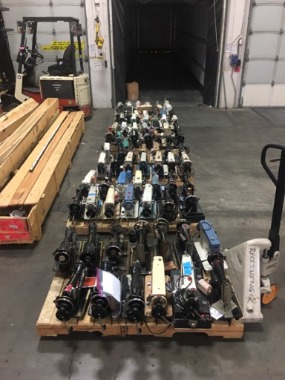
One of those women who received a hand crank sewing machine and the training in early 2021 is a refugee from Venezuela who sought a better life in Guyana.
“This project has helped meet my family’s needs,” Maria said in a U.N. blog post. (Her name was changed in the post for confidentiality purposes.) “We sew face masks. We first did them by hand, but when we got sewing machines it all became faster and more efficient.”
Now she has dreams of bettering her life and hopes to build her business and expand production to include sewing children’s clothes.
Da Silva also plans to expand her sewing business to make things like cosmetic and pencil cases.
It’s exactly what Rich hoped to see. “We teach a woman how the sewing machine works, how to thread it, how to oil it and maintain it. But we don’t teach her what to sew. That’s up to them and their local needs,” he said.
Meeting Local Needs and Improving Lives
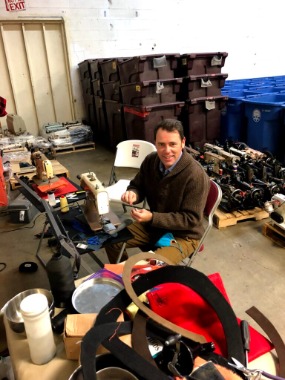
Rich told the Church News he believes the generational effect of a sewing machine will continue to lift families from poverty for three or more generations. “The women in Guyana will pass the sewing machines we gave them down from mother to daughter. That is why it is impossible to know the full impact our sewing machines will have. That is only known by God,” he said.
Rich continues to fundraise and convert and send hand crank machines to other countries, where his machines have been used to make medical supplies, cleaning products, clothing and school uniforms so girls can attend school. “Every day, we save women we do not know. They do not know us, but God knows us both. That’s enough,” Rich said.
At the year mark of sending those machines by ship to Guyana, Hatch reflected on the mission of Latter-day Saint Charities and the opportunities to improve lives.
“This really is a project that demonstrates the flexibility of Latter-day Saint Charities to respond to local needs and engage with local organizations to carry out these local needs. These type of projects seem to be more sustainable and impactful than trying to create a master project that can be implemented around the world,” said Hatch.
Copyright 2021 Deseret News Publishing Company